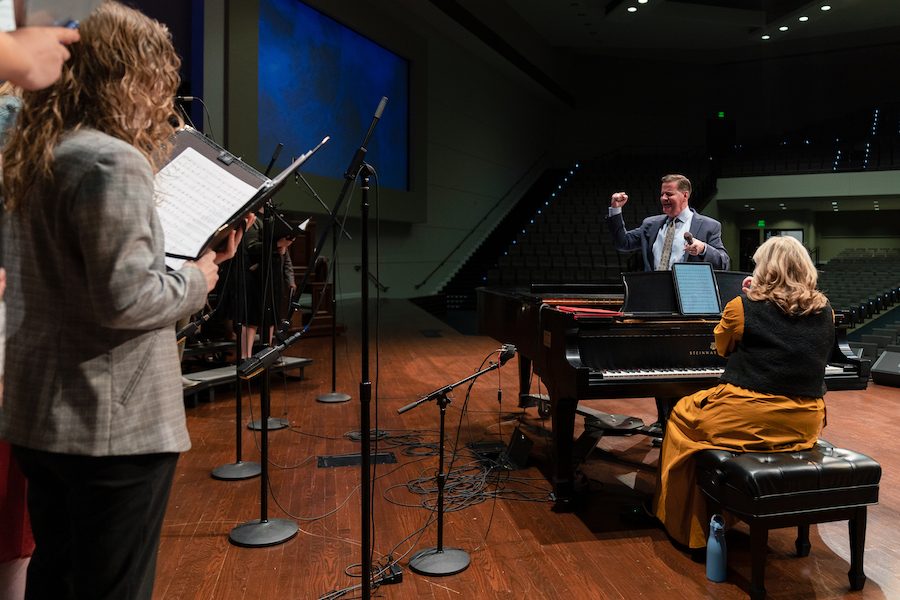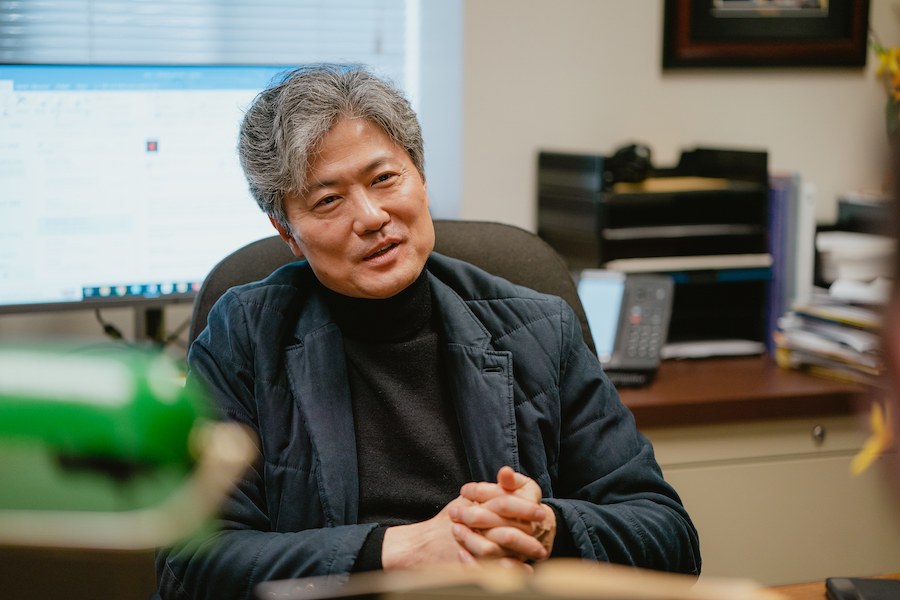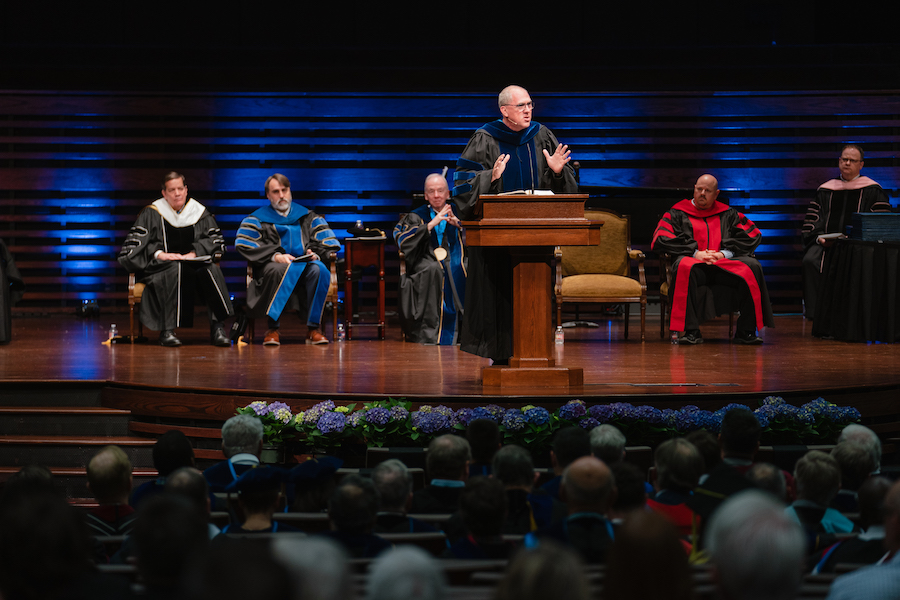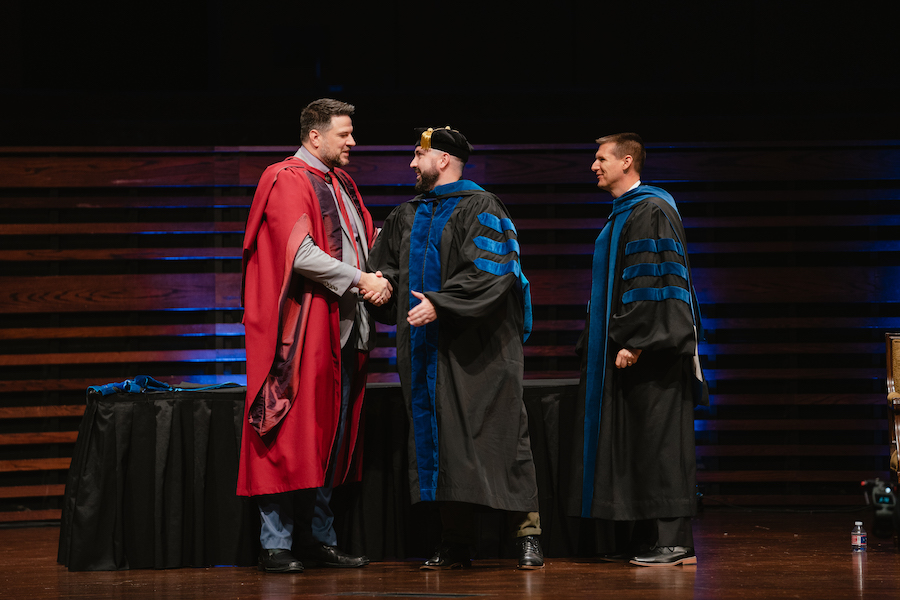‘Forward-thinking’ Southwestern eases mid-semester shift to online-only courses, students and professors say
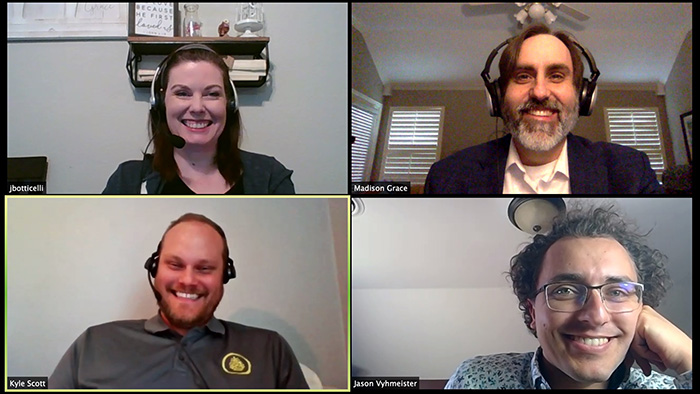

When COVID-19 precautions required the moving of all on-campus courses to online delivery, the “forward thinking” of The Southwestern Baptist Theological Seminary allowed faculty and students to adapt quickly to a new normal. Classes that formerly took place on campus now consist of pre-recorded materials, logging in to online video conferences for live lectures and class discussions, and conducting all communication from home.
The adjustment to this new entirely virtual experience is reflective of an unprecedented moment in time for all, but students and faculty acknowledge that although the context of their classes has changed, their commitment to their work has remained.
“I have never been prouder to be a Southwesterner as our incredible faculty and staff efficiently moved our entire educational program online in the span of a few weeks to best serve our students during this season of extraordinary disruption for our students, churches, and nation,” President Adam W. Greenway says. “The coronavirus pandemic has not lessened the urgency of theological education; indeed, it has only heightened that urgency. Ever since our founding in 1908 and continuing through our storied history up to this very moment, Southwestern Seminary has remained committed to providing biblically and theologically faithful and academically rigorous comprehensive theological education with a strong practical focus on equipping God-called servants of Jesus Christ.”
Despite the challenges of mid-semester changes, Master of Arts student Jessika Sams from Tampa, Florida, says the transition happened more smoothly than she expected.
“In most of my classes, I feel like I am getting the same experience I would have while I was in class,” Sams says, explaining that her professors have provided both recorded materials and live interactions on Zoom.
“Because of Zoom,” she says, “very little about how class is conducted or how professors interact with students has changed. We’ve been able to maintain class community and interaction with professors during live sessions on Zoom or through discussion boards on Blackboard.”
The online course experience is routine to many students who had already been utilizing the seminary’s online and flex-access degree programs. Despite the need to quickly get every student and every course into an online context, Southwestern Seminary was already equipped to help its students, members of the faculty say.
L.R. Scarborough Chair of Evangelism Matt Queen says that because Southwestern Seminary has had a strong online and distance-learning presence for many years, the changes have been minimal.
“Adam Dodd and our Campus Technology team have been our faculty’s greatest advocates in terms of digital education experience,” Queen says. “Whenever I have had a question or problem, they have responded to me promptly and provided solutions to any need I have had. They do not only ensure we can offer an online education at Southwestern Seminary; they have built a state-of-the-art online educational experience!”
For students like Laramie Minga, who have benefited from such online programs as the flex-access Doctor of Philosophy program, this time of transition has essentially meant “business as usual.”
“It’s still not completely the same experience one would have in a residential program,” Minga says, “but Southwestern Seminary has done a great job of limiting the deficiencies of an online program by providing us with resources.”
Minga, a student from Baton Rouge, Louisiana, is in one of Associate Professor of Church Music and Worship Scott Aniol’s three Ph.D. seminars, each already set up with Zoom for distance students, so the transition has been fairly seamless.
“This speaks to the strength of our flexible access programs and the fact that we already had technology in place, ready for when we needed it,” Aniol says. “I am very thankful that our administration has already been forward-thinking with regard to technological options for our students such that, in many cases, this transition, though certainly unprecedented and challenging, was made far smoother since we already had robust distance-learning options and the technological infrastructure to support it.”
Unlike some of the master’s and doctoral programs, Scarborough College is an entirely residential program. This transition has thus required greater adjustment for everyone in the college, but Sarah Spring, associate dean for student success, says that all have adapted well, and the faculty has worked to ensure a positive student experience.
Acknowledging the challenges many students may be facing during this time, Spring offers this encouragement to her students: “Don’t give up! Reach out if you are discouraged or having trouble with your classes, and remember your professors are here to help.”
Students and professors both miss the unique advantages of an in-person, interactive class experience, but professors like Associate Professor of Apologetics and World Religions Travis Kerns say they are trying to ensure a positive professor-student relationship despite the physical distance.
“I know this is a trying time for everyone, but I want my students to feel that the only change that has taken place is the change from in-class meetings to online meetings,” Kerns says. “The way I conduct class has not changed. I love having interactive classes and always encourage students to interrupt me with questions or comments. I have continued that trend and will continue it.”
Master of Divinity student Brit Redfield from Mansfield, Texas, admits she is also missing the “person-to-person” interaction. But although nothing truly replaces that type of classroom experience, she says, the seminary and professors have made the fully-online experience a positive one.
“The school was very quick to get everything up and running so that we could seamlessly transition into our completely online portion of the semester,” Redfield says. “It almost feels like the same class environment. It’s the next best thing.”
Although some courses transitioned more naturally, others have required additional creativity. Associate Professor of Voice Ben Caston, for example, has had to reconsider his methods for teaching vocal lessons.
A typical lesson, Caston says, would begin at the piano playing scales and doing warm-ups for the student. In an online session, he says that is not possible. Caston explains that he and his students have made the most of various technologies that aid a virtual vocal lesson, including the practice and learning of voice literature.
“The experience of teaching online voice lessons has instantly changed how I listen to singers,” Caston says, adding that his students have also risen to the challenge. “My students appear to be resilient in their work. They want to succeed, and they are eager to learn.”
Students and professors recognize the unusual nature of their sudden shift to online-only courses, but say they are all resolved to press on in their academic study and work.
Professors continue to cover the same course material and discussions and are willing to do what it takes to maintain some of the positive elements typically unique to an in-person classroom experience.
Malcolm Yarnell, research professor of systematic theology, says, “The best way to create a positive student experience is to be positive in your own spirit. The good online professor is the same as a good on-campus professor. He or she knows the context of the students, identifies their needs, and does everything possible to minister the grace of theological education to them.
“Our context and our methods may change, but our divine calling and positive spirit may not.”
